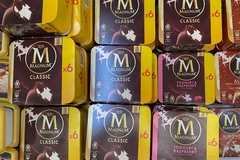
- Industry news
Industry news
- Category news
Category news
- Reports
- Key trends
- Multimedia
- Journal
- Events
- Suppliers
- Home
- Industry news
Industry news
- Category news
Category news
- Reports
- Key trends
- Multimedia
- Events
- Suppliers
Heineken Holding N.V. Raises Full Year Profit Forecast Due to Strong Organic Net Profit Growth in Third Quarter

Revenue totalled EUR4,070 million, down 0.4% organically. The positive price and mix effect (+2.6%), almost fully compensated for the lower volume effect (-3.0%). The adverse effect of currencies on revenue amounted to 4.9%.

28 Oct 2009 --- Heineken Holding N.V. issued its trading update for the third quarter of 2009. Organic EBIT (beia) grew in the mid teens thanks to strong pricing, improved sales mix and aggressive cost cutting, offsetting lower volume due to the global recession.
* EBIT (beia) grew by double digits, despite an adverse currency effect
* Heineken increases its forecast for organic net profit (beia) growth to low double digit for the full year 2009, versus a previous forecast of at least high single digit
* Heineken’s revenue declined 3.9%, organically revenue was down 0.4%
* Organically, consolidated beer volume decreased 4.7% totalling 35.3 million hectolitres, an improvement versus the trend in the first half year
* Volume development of the Heineken brand in the premium segment outperformed again the Group’s beer volume, and totalled 6.8 million hectolitres, or -2.7%
* Heineken N.V.’s Total Cost Management (TCM) programme delivered cost savings as planned, with the closures of 4 breweries and three malteries announced during September and October
* Heineken in the UK continued to gain market share and further reduced costs in the third quarter
Revenue totalled EUR4,070 million, down 0.4% organically. The positive price and mix effect (+2.6%), almost fully compensated for the lower volume effect (-3.0%). The adverse effect of currencies on revenue amounted to 4.9%.
Results
EBIT (beia) grew organically in the mid teens in the third quarter, driven by improved pricing and sales mix and cost savings, despite lower volume. Reduction in personnel, energy and water expenses and efficiencies in marketing were key drivers of the performance. First time consolidation had a limited but positive contribution, whilst weaker currencies affected EBIT by EUR36 million.
Heineken N.V.’s TCM programme is on track. In the third quarter, further cost reductions were achieved through the closure of breweries in France and Spain. Heineken announced plans to close a further four breweries (2 in Russia, 1 in UK and 1 in Finland) and 3 malting plants in Romania, generating future savings. Lower costs were also realised in the European wholesale business.
Exceptional items in the quarter amounted to EUR45 million at EBIT level and are related to brewery closures in Western and Central Europe.
Outlook
Following the positive development of Heineken’s financial performance in the third quarter and given the current trading, Heineken increases its forecast for organic net profit (beia) growth for the full year 2009 to low double digit, versus a previous forecast of at least high single digits.
Net profit (beia) in 2009 may still be slightly lower than in 2008, due to weaker currencies in the second half of the year and the negative contribution of first time consolidation in the first half.
Heineken will continue to focus on investing in its key brands and pursue its TCM cost cutting programme, in order to drive profitability and ensure higher cash generation.
Due to the planned brewery closures and the quick roll out of the TCM programme, Heineken expects exceptional costs of EUR130-150 million in 2009 at EBIT level, of which approximately two thirds will be non-cash.
As communicated previously, Heineken expects an average tax rate of 26-27% for 2009.
Beer volumes development
In the third quarter, consolidated beer volume was 4.1% lower. Africa continues to show organic volume growth, albeit at a slower pace than in the first half. In Europe, Asia and the Americas, volume continues to be under pressure as a result of the global economic conditions, which also result in consumers trading down to low-margin private label beers, a segment in which Heineken does not seek to compete.
Volume performance of the Heineken brand in the international premium segment outperformed once again the group’s beer volume. Lower volumes in USA, Spain and Russia offset the strong growth of the brand in France, South Africa and Asia.










